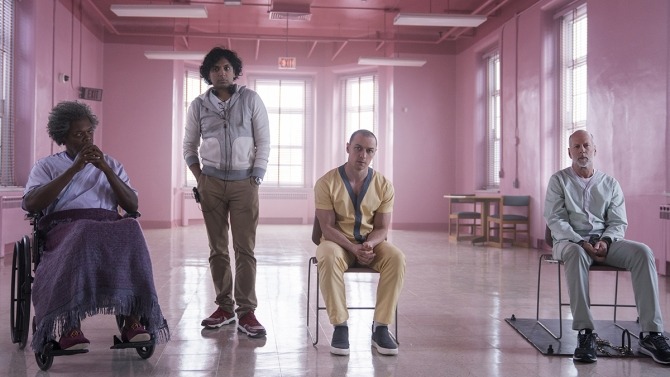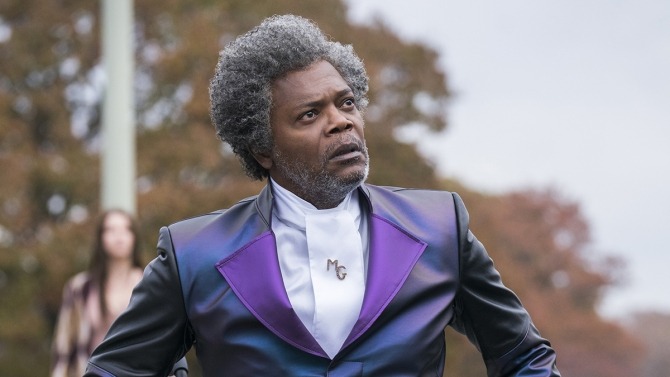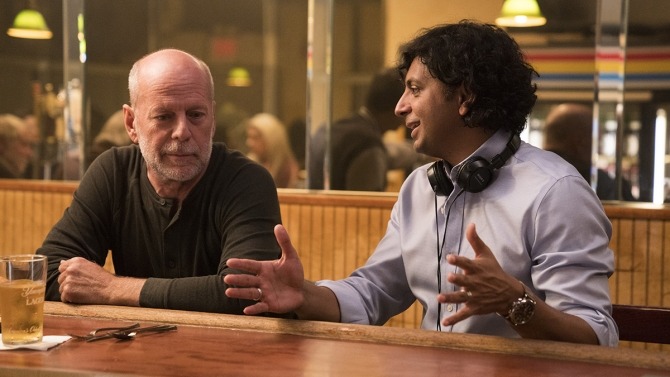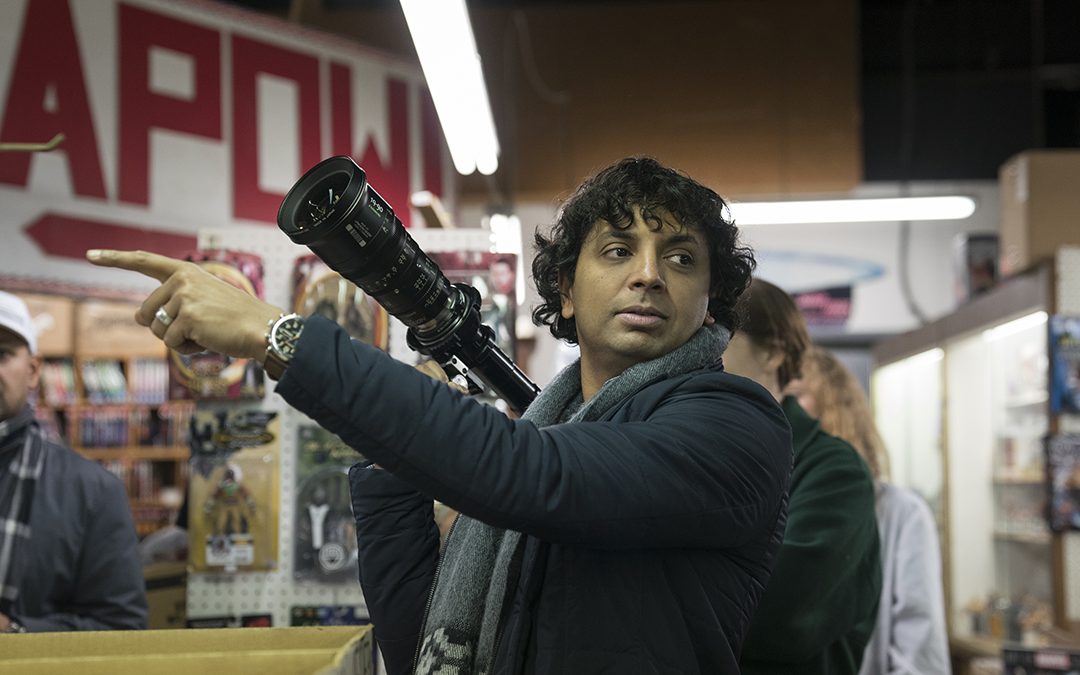It’s been a long road to the big screen for Glass, the third – and, if the director is to be believed, final – movie in M. Night Shyamalan’s surprise superhero trilogy. Nineteen years, in fact. Not that we knew it… Despite mumblings of follow-ups from star Bruce Willis and co over the years, most of us assumed that 2000’s Unbreakable was destined to be a one-off cult classic.
Of course, that was until Shyamalan’s Split – a thriller centred around James McAvoy’s multifaceted serial killer, Kevin Wendell Crumb – made its big reveal: an unexpected epilogue that placed the film in the Unbreakable universe.
After Split’s success at the box office, Shyamalan finally had his chance to complete his story with Glass: a crossover event that sees McAvoy’s ‘The Horde’ (as he’s now known) and Willis’ David Dunn (aka ‘The Overseer’) go head-to-head, with Samuel L Jackson’s sinister puppet-master Mr Glass – a comic-book obsessive with a genius-level intellect – pulling the strings.
With Shyamalan’s trilogy now complete, Den of Geek sat down with the director to talk about his vision for Glass, the changes in the movie landscape over the last 20 years and whether he’s really done with his “grounded” superhero franchise…

A lot has changed since Unbreakable was released almost 20 years ago – superhero movies are now a mainstay of popular cinema, as opposed to a risky prospect. Did that change give you the impetus to finish your trilogy?
The fact that comic-book movies are prolific now helped in terms of getting the movie to be accepted by the system. But that wasn’t related to why I got interested in making this series again. I became interested again because the accepted tone of cinema has changed in my favour; in favour of my tastes.
In Unbreakable, the weirdness and the darkness of where I wanted to go was much less comfortable for audiences. Take the dance sequence in Split, for example, where Hedwig [one of Crumb’s 24 personalities who manifests as a nine-year-old boy] is dancing for Casey [played by Anya Taylor-Joy]. In 2000, that might have been too weird for an audience, like, “That’s stupid…Is this supposed to be funny?” It would have been seen as a negative. But by the time Split came out, people were laughing and scared. It’s disturbing.
That tone has allowed me to finish the series in the way I was hoping to. I can be very dark and very weird, and it wouldn’t just be laughed at. Just because something’s an oddity, it’s not necessarily wrong anymore. You know, what was too weird with Kubrick and Lynch would be more accepted today, in my opinion. So that’s the real exciting movement in the marketplace. I saw that become mainstream and I’m like, “OK, let me get back in there.”
For a superhero tale, you have two aces up your sleeve in that you have two very strong villains. Let’s start with The Horde – James really seems to up the ante this time around…
I feel that James has given the performance of the year. I felt he did it last time [with Split], and he did it even more this time. He just has all the attributes that we needed for someone to play Kevin Wendell Crumb and his 24 personalities. The biggest one was empathy – he can make you feel emotional for every single one of those personalities. That’s an amazing thing.
And then to be a physical actor at the scale that he had to, to change calibrations so slightly to be able to play a child, a woman, a beast… It’s incredible. I think he and I grew into it over the course of Split and then into Glass. We grew into what we were creating together. But he’s the perfect person for it. I mean good or bad, I think he’ll forever be known for playing Kevin.

And then you’ve got Samuel L Jackson returning as Mr Glass, the film’s sort-of omniscient narrator. What did he bring to the role this time around?
I love him. A lot of people have asked me, “Is he [Mr Glass] you?” And I do feel that way. I feel very connected to the character. When I was writing the movie, I told Sam, “I’m so enjoying writing your character.” Because he’s narrating his own story structure.
Sam is a very smart guy. You’ve got Mr Glass, who’s an expert on pop culture, and then Sam Jackson, who is pop culture. Again, he’s exactly the right person to play Mr Glass. You know, Sam knows everything about Korean movies or this or that – you name it, he knows it… and he’s not bullshitting. He really lives graphic novels and really thinks about them.
Him playing this role has taken on an even more interesting, almost meta spin since Unbreakable, now that he’s so well known for playing Nick Fury in the Marvel Universe…
Yeah. In all those pieces, he’s a side character – you know, he’s kind of peripheral. And for me, Mr Glass is really the central character of all these three movies, presenting his thesis about how things are going to go and how there’s a higher order of things.
That’s how Mr Glass and I are really connected: I do think there is a bigger picture and that we’re all part of it. Not in a religious way – I’m the opposite of religion – but that everybody has some connection to this bigger picture.
The final part of the triptych is Bruce Willis – how was it working with him again after all these years?
He was so into it and so positive. He came to Philly [Philadelphia, where the movie was filmed and is set] even when he wasn’t shooting; he would just hang out and be with us and watch the other guys shoot. He just wanted to live in the world that we were in.
I wanted to bring out a more fatherly part of him this time around. Also this sense of being tired, maybe because he’s been a superstar since Moonlighting. It’s like his character, David Dunn, in the sense that he’s been this icon for so long, like a kind of weariness.
The effects in the film are almost defiantly in-camera, with not a lot of obvious CGI. Was that a deliberate choice?
Yeah. It’s important because my brain doesn’t work in that other way. For whatever reason when I’m working on a computer screen, it’s different. I like to be standing there, directing things on set. Very minimal. We knew we were going to have to go do battle against Marvel. We had to go do battle in the way that Marvel does battle around the world, but with only one-thirtieth of the budget. And I love it. But our strength is not in excess. I’m not going to out-Avengers the Avengers, you know – like the big camera pans across the buildings. Really, this is a movie that keeps talking about where the Marvel movie would go. And then doesn’t go there.

The use of colour in the film is really striking. What was the thinking behind that?
Colours are such a huge thing to me in terms of telling a story. In this trilogy, primary colours are really important – they represent the comic-book world. The base world is very monochromatic, like in Unbreakable, and then you start to see more colour at the same time as the characters become more self-aware.
David’s colour is green, which is traditionally a life-giving colour, so it felt very much like the protector of life. The ochre or mustard colour for The Horde comes from a spiritual colour that’s used in Hindu ceremonies, like monks’ robes. It’s usually tied into spiritual endeavours. And so the reason I did that was because I felt like The Beast [Kevin’s super-powered personality] was an evangelist, who has come to say that those people who’ve been through trauma are not lesser, and so he represents kind of healing them with a different point of view. And then purple has traditionally been associated with nobility and majesty and royalty. Mr Glass thinks of himself as royalty in this world.
When you see the color palette in the movie like the pink room where they’re doing therapy – that’s essentially those strong colours fading to white. And that’s the room where you stop believing in the extraordinary. And so the colours of Sarah Paulson’s character [a psychiatrist specialising in superhuman “delusions”] and any of the hospital colours are very washed out – very pale blues and greys and whites. That’s where you’re going to the “ordinary”.
This feels like a pretty definitive ending, but is there any situation where you could see yourself returning to the franchise?
I think it’s done. I don’t want to ever say never, but I don’t think so, because I just want to go on and tell other stories and be an original filmmaker.
The idea of doing a sequel to this has always kind of turned me off a little bit. Not like it’s cheating, but there’s something inorganic about it. You know, like: “We had a great date last week. Do you want to go to the exact same restaurant again this week?” Weird. I like that sense of trying to have a new relationship each time and it’s fun and scary. So two weeks from now I’m going to start writing a new movie that has nothing to do with it.
Glass is out in cinemas now

